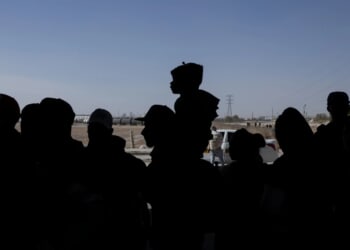Israeli Prime Minister Benjamin Netanyahu is finding himself increasingly isolated diplomatically at the same time that he must make legacy-defining choices over the fate of the Gaza Strip.
Netanyahu, in addition to facing calls at home for an end to the war, must navigate pressure from European countries that have threatened to reprimand Israel for its latest advance into Gaza and President Donald Trump’s insistence that the prime minister promptly end the war. The demands have presented Netanyahu with a difficult choice as he weighs whether or not to see through a full occupation of the war-torn territory despite friction with his chief Western backers.
“I think where Israel is today is an understanding that Hamas really isn’t going to come to any agreement, and that the hostages are not likely to come back,” Gabriel Noronha, president of Polaris National Security, told the Daily Caller News Foundation. “That’s sort of where I see things going. The question is, how do you get your hostages back in a way that’s politically acceptable?” (RELATED: Legacy Media Outlets Worked With Literal Terror Propagandist, Hamas Doc Shows)

Displaced Palestinians gather to collect portions of cooked food at a charity distribution point in Jabalia in the northern Gaza Strip on May 19, 2025. (Photo by BASHAR TALEB/AFP via Getty Images)
Israel made a new push to capture the entire Gaza Strip under “Operation Gideon’s Chariot,” with over 300 people killed in Israeli airstrikes since May 15. In total, Palestinian health authorities — which are run in Gaza by Hamas and do not distinguish between civilians and combatants in their casualty figures— estimate that 50,000 Palestinians have died during the war as of March 2025, though the tally is disputed.
In reaction to the Israeli offensive, U.K. Foreign Secretary David Lammy announced the suspension of free-trade talks with Israel, adding that the 11-week block on aid to Gaza was “cruel and indefensible.” France and Canada also joined the U.K. in calling out Israel’s new push into Gaza, saying they would take “concrete action” if Netanyahu did not halt his advance.
Netanyahu subsequently accused the three nations of “emboldening Hamas” in an address on Friday.
“I say to President Macron, Prime Minister Carney and Prime Minister Starmer: When mass murderers, rapists, baby killers and kidnappers thank you, you’re on the wrong side of justice,” Netanyahu said. “You’re on the wrong side of humanity and you’re on the wrong side of history.”
Israel has blocked aid from entering Gaza for three months, partially lifting the blockade on May 18. The World Health Organization (WHO) claimed that a famine could break out in Gaza if aid continued to be stifled.
From the U.S. side, Trump has reportedly expressed impatience with Netanyahu, calling on the war to end quickly but stopping short of abandoning Netanyahu entirely, two White House officials told Axios on Tuesday. The U.S. is the largest financial and military supporter of Israel, sending nearly $310 billion in overall assistance over the course of the country’s existence.
Trump previously pressured Netanyahu to commit to a ceasefire in Gaza in January, which freed 33 hostages held in Hamas captivity. However, the agreement broke down in March when further hostage releases stalled, leaving 58 hostages in Gaza, of which at least 20 are thought to be alive. (RELATED: Well-Connected Billionaire Leveraged US Tax Dollars To Help Hamas Gear Up For Oct. 7, Lawsuit Alleges)

Hamas terrorists stand next to Israeli hostages (L-R, holding certificates) Ohad Ben Ami, Eli Sharabi and Or Levy on a stage before handing them over to a Red Cross team in Deir el-Balah, central Gaza, on February 8, 2025, as part of the fifth hostage-prisoner exchange of a fragile ceasefire. (Photo by EYAD BABA/AFP via Getty Images)
While Netanyahu’s position is certainly precarious, all is not lost for his career given his reputation for getting out of politically perilous situations. One such example is his surprise election victory in 2022, in which he beat a broad coalition hellbent on ousting him from the government, Annelle Sheline, research fellow in the Middle East Program at the Quincy Institute, told the DCNF.
“Netanyahu is very good at getting out of difficult political situations, and we’ve seen him survive instances in the past when everyone said, ‘Oh, it seems like this is it for him,’” Sheline told the DCNF. “A big part of his motivation to continue the war is to avoid accountability for the various legal troubles he’s in once he’s no longer minister.”
In addition to a November 2024 arrest warrant for alleged crimes against humanity issued by the International Criminal Court (ICC) that ostensibly leaves him exposed to arrest if he stepped into one of 124 countries worldwide, Netanyahu is also currently on trial facing corruption charges that his supporters have largely dismissed as politically-motivated. Critics lambasted the ICC warrant, arguing that it destroyed the ICC’s credibility; former President Joe Biden condemned the move at the time.
Despite his difficulties abroad, Noronha thinks that Netanyahu’s position in the Israeli Knesset is likely secure, as his coalition continues to hold the majority while picking up even more seats in the September 2024 elections by appointing rival Gideon Saar to the security cabinet.
The September 2024 election results came as a surprise to some given that Netanyahu’s party was initially projected to lose the majority for his broader coalition in a hypothetical election following the Oct. 7 massacres.
“His coalition is still the strongest coalition, and frankly, he’s the most stable arrangement of all the alternatives to him, in terms of internal Israeli political dynamics,” Nornoha told the DCNF. “I suspect the election is going to be a validation of his governing approach, and I expect his coalition to gain some seats. So I don’t think he’s going anywhere.”
As of mid-May, Netanyahu’s governing coalition would fall short of a majority and lose to former Prime Minister Naftali Bennett in a hypothetical election, according to a Channel 13 news poll released Wednesday. Moreover, 67% of respondents indicated support for ending the war in Gaza with a hostage deal in the same poll.
Netanyahu’s office did not respond to the DCNF’s request for comment.
All content created by the Daily Caller News Foundation, an independent and nonpartisan newswire service, is available without charge to any legitimate news publisher that can provide a large audience. All republished articles must include our logo, our reporter’s byline and their DCNF affiliation. For any questions about our guidelines or partnering with us, please contact licensing@dailycallernewsfoundation.org.




![Stephen A. Smith Goes Ballistic on DeMS-13 Senator Van Hollen [WATCH]](https://www.right2024.com/wp-content/uploads/2025/05/Stephen-A-Smith-Goes-Ballistic-on-DeMS-13-Senator-Van-Hollen-350x250.jpg)


![Donald Trump Pardons ‘Century Men’ During West Point Commencement Speech [WATCH]](https://www.right2024.com/wp-content/uploads/2025/05/Donald-Trump-Pardons-‘Century-Men-During-West-Point-Commencement-Speech-350x250.jpg)

![Minnesota Officials Panicking Over Derek Chauvin Pardon Speculation, Potential Unrest [WATCH]](https://www.right2024.com/wp-content/uploads/2025/05/Minnesota-Officials-Panicking-Over-Derek-Chauvin-Pardon-Speculation-Potential-Unrest-350x250.jpg)







